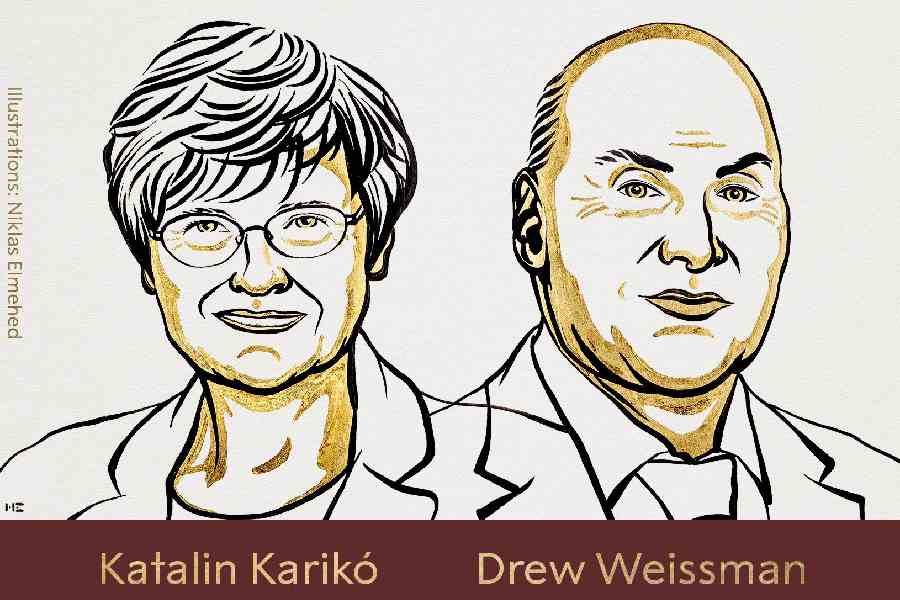Katalin Karikó and Drew Weissman, who together identified a chemical tweak to messenger RNA that laid the foundation for vaccines against Covid-19 that have since been administered billions of times globally, were awarded the Nobel Prize in Physiology or Medicine on Monday.
Their discovery “fundamentally changed our understanding of how mRNA interacts with our immune system,” the panel that awarded the prize said, adding that the work “contributed to the unprecedented rate of vaccine development during one of the greatest threats to human health in modern times.”
Dr. Karikó, the daughter of a butcher in Hungary who became an mRNA specialist, and Dr. Weissman, a physician and virologist searching for an H.I.V. vaccine, met over a copy machine at the University of Pennsylvania in 1998.
Their work soon transformed vaccine technology.
Dr. Karikó, who had come to the United States two decades earlier when her research program at a Hungarian university ran out of money, was preoccupied by mRNA, which provides instructions to cells to make proteins. Defying the decades-old orthodoxy that it was clinically unusable, she believed that it would spur many medical innovations.
At the time, Dr. Weissman was desperate for new approaches to a vaccine for H.I.V., which had long proved impossible to defend against. He wondered if he and Dr. Karikó could team up to make an H.I.V. vaccine.
It was a fringe idea that, when they began their research, seemed unlikely to work. The mRNA was delicate, so much so that when it was introduced to cells, the cells instantly destroyed it.
Initially, Dr. Weissman and Dr. Karikó were flummoxed.
Countless experiments with mice failed. They wandered down one blind alley after another. Their problem was that the immune system sees mRNA as a piece of an invading pathogen and attacks it, making the animals sick while destroying the mRNA.
But eventually, the scientists solved the mystery. The researchers discovered that cells protect their own mRNA with a specific chemical modification. So the scientists tried making the same change to mRNA made in the lab before injecting it into cells. It worked: The mRNA was taken up by cells without provoking an immune response.
At the time, scientists were largely uninterested in taking up that new approach to vaccination. Their paper, published in 2005, was summarily rejected by the journals Nature and Science, Dr. Weissman said. The study was eventually accepted by a niche publication called Immunity.
But two biotech companies soon took notice of the work: Moderna, in the United States, and BioNTech, in Germany. The companies studied the use of mRNA vaccines for flu, cytomegalovirus and other illnesses. None moved out of clinical trials for years.
Then the coronavirus emerged. The strikingly effective vaccines made by Moderna and Pfizer-BioNTech use the modification Dr. Karikó and Dr. Weissman discovered.
Some 400 million doses of the Pfizer-BioNTech vaccine and 250 million doses of the Moderna vaccine have now been administered in the United States. Hundreds of millions more have been given globally. The use of mRNA has enabled both vaccines to be updated against new variants.
Dr. Karikó is the 13th woman to be awarded the Nobel Prize in Physiology or Medicine since 1901, and the first since 2015. Women represent a small fraction of the total of 227 people who were awarded the prize, a reflection of how women are still largely underrepresented in the field of science and scientific awards, including the Nobel Prizes.
Women account for less than 7 percent of Nobel laureates, a total that has produced criticism for the institute that awards the prizes.
When will the other Nobel Prizes be announced?
The prize for physiology or medicine is the first of six Nobel Prizes that will be awarded this year. Each award recognizes groundbreaking contributions by an individual or organization in a specific field.
- The Nobel Prize in Physics will be awarded on Tuesday by the Royal Swedish Academy of Sciences in Stockholm. Last year, John Clauser, Alain Aspect and Anton Zeilinger each won for independent works exploring quantum weirdness.
- The Nobel Prize in Chemistry will be awarded on Wednesday by the Royal Swedish Academy of Sciences in Stockholm. Last year, Carolyn R. Bertozzi, Morten Meldal and K. Barry Sharpless shared the prizes for work on click chemistry.
- The Nobel Prize in Literature will be awarded on Thursday by the Swedish Academy in Stockholm. Last year, Annie Ernaux earned the prize for work that dissected the most humiliating, private and scandalous moments from her past with almost clinical precision.
- The Nobel Peace Prize will be awarded on Friday by the Norwegian Nobel Institute in Oslo. Last year, the prize was shared by Memorial, a Russian organization; the Center for Civil Liberties in Ukraine; and Ales Bialiatski, a jailed Belarusian activist.
- Next week, the Nobel Memorial Prize in Economic Sciences will be awarded on Monday by the Royal Swedish Academy of Sciences in Stockholm. Last year, Ben S. Bernanke, Douglas W. Diamond and Philip H. Dybvig shared the prize for work that helped to reshape how the world understands the relationship between banks and financial crises.
All of the prize announcements will also be streamed live by the Nobel Prize organization.
New York Times Services










